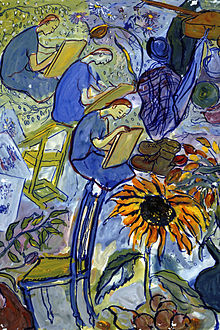
I didn’t know Charlotte Salomon before reading Charlotte. I wasn’t enthused about reading this book (So why did you request it from Netgalley then? one asks. Because I request everything from Netgalley because free books. That doesn’t seem like a very good reason. Well, no. It isn’t.) But sometimes a book comes along at exactly the moment you need to read it.
Little by little, she does everything more slowly: eating, walking, reading. Something inside her is slowing down.
Her body, I imagine, being infiltrated by melancholy.
The kind of melancholy that devastates, that never goes away. Happiness becomes an island in the past, unreachable.
I know that feeling!
Grandmother and granddaughter understand each other. Their hearts beat in the same way.
That’s how I feel about my grandmother, who I miss like a limb more and more each day.
Paint so she will not go crazy.
Replace paint for write fiction and that’s also me.
So I needed this. I needed Charlotte by David Foenkinos.
In style, tone, topic, time period, basically every descriptor of the novel, Charlotte reads like HHhH by Laurent Binet: clipped sentences that function as paragraphs, Holocaust, Europe, World War II, the act of resistance, the narrator as a character in the novel itself, the narrator’s search in the here-and-now woven into the historical story of Charlotte Salomon. But don’t mistake this for Charlotte being derivative. It’s its own story. As Foenkinos says:
I felt the need to move to the next line in order to breathe.
So, I realized that I had to write it like this.
Maybe now, with distance, with writing about atrocities removed from one’s own existence by the passage of time, that’s all a writer can do: a line or two and then a breath. Else we become overwhelmed. Even so, missteps occur. I knocked a full star off (to four stars out of five) for Foenkinos’ disingenuous comparison of his being spoken to rudely by a woman who didn’t want him to come onto her private property to the anti-Semitism Charlotte Salomon endured in Nazi-occupied France. Those two things do not merit comparison. I did not like that part. Actually, you can’t really like anything in a book about the Holocaust, can you? Like is for ice cream and action movies. I’d say that part made me angry, but the whole book made me angry because one is angry when reading about the Holocaust. One has to be. Disgusted, same descriptive problem. So I guess I’m back to a misstep. Try to ignore that page and read on.
Thus, in summary and in repetition, I needed to read this.
Charlotte by David Foenkinos went on sale May 3, 2016.
I received a copy free from Netgalley in exchange for an honest review.